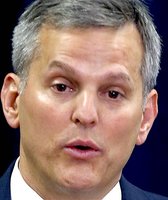Stand up for the facts!
Our only agenda is to publish the truth so you can be an informed participant in democracy.
We need your help.
I would like to contribute
SUMMARY: Hillary Clinton and Barack Obama clarify their positions on taxes, while John McCain goes on the attack and gets it only half right.
When we first looked at the question of capital gains taxes, we were surprised that we couldn't find a clear position from Sen. Hillary Clinton on whether to raise the tax or not.
So while Charles Gibson and George Stephanopoulos were criticized for their Philadephia debate performance and their "gotcha" questions — flag pins, '60s radicals, sniper fire — give them credit for getting Clinton and Sen. Barack Obama on the record on tax issues.
Gibson pinned down Clinton on capital gains. Clinton said she might or might not raise capital gains taxes, but not above 20 percent. This is the first definitive statement from her on this matter that we were able to find. Obama previously said he would raise capital gains taxes to between 20 and 28 percent. We updated our analysis of their position on capital gains taxes here .
Obama, meanwhile, had spoken about rolling back the George W. Bush tax cuts on "the top 1 percent." Answering Gibson's questions, he clarified that the threshhold income for higher taxes would be between $200,000 and $250,000. We updated our analysis of Obama and Clinton on the Bush tax cuts here .
Sign up for PolitiFact texts
Meanwhile, Republican nominee Sen. John McCain is talking capital gains as well. "Senator Obama says that he doesn't want to raise taxes on anybody making over $200,000 a year, yet he wants to nearly double the capital gains tax. Nearly double it, which 100-million Americans have investments in — mutual funds, 401(k)s — policemen, firemen, nurses," McCain said in an interview with Stephanopoulos. "He wants to increase their taxes."
So what is a capital gains tax? The IRS explains: "Almost everything you own and use for personal purposes, pleasure or investment is a capital asset." When you sell an asset for a profit, that profit margin is your capital gain, and the IRS taxes you on it. Capital gains taxes vary depending on the income level of the tax filer and the length of the investment, with separate tax rates for short-term vs. long-term capital gains.
People who sell stocks for a profit are often concerned about capital gains taxes. Presidents Bill Clinton and George W. Bush cut capital gains taxes, so people now typically pay a lower tax rate on their capital gains than they do on their regular income. The long-term capital gains tax rate for higher income brackets is 15 percent, considerably lower than their marginal income tax rates. (If you're making more than $32,000 a year, your income tax rates range from 25 percent to 35 percent. See a detailed income tax chart here .)
McCain is right about Obama's position on capital gains taxes. If Obama raises them all the way to 28 percent, that would be almost doubling them.
McCain's also right that many Americans hold mutual funds and 401(k)s. About 96-million hold mutual funds, according to industry estimates, with about 84 percent holding mutual funds in 401(k)s and other defined contribution retirement plan accounts.
But McCain's assertion that it would affect 401(k)s and people with middle-class incomes is questionable. People aren't taxed on their 401(k)s until they withdraw the money. When they do, it's subject to regular income taxes, not capital gains taxes. So Obama's position on capital gains taxes would not affect most working people saving for retirement. We found his statement Half True. ( For more details on McCain's statement about capital gains taxes, click here .)
Our Sources
See individual items for sources.























































